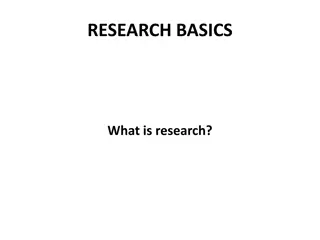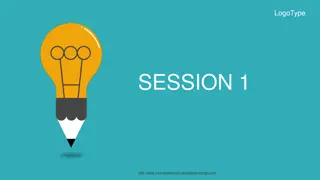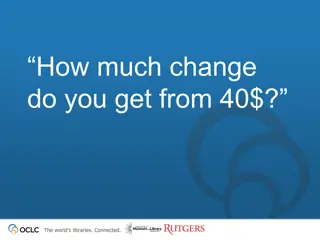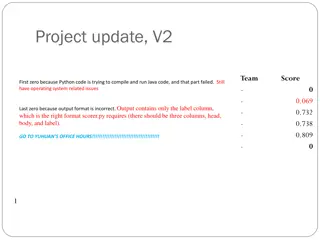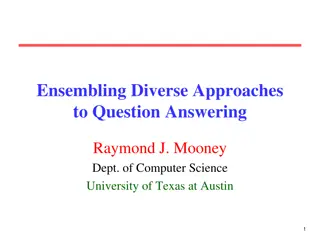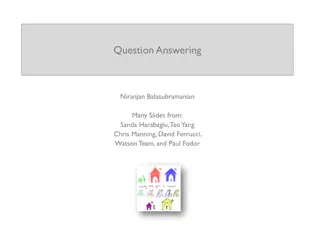The Importance of Research Methods in Building Knowledge and Answering Questions
Research methods play a pivotal role in shaping how we construct knowledge, address research inquiries, and determine the questions we can explore. Practices in research are evolving with open-science initiatives, data sharing, and innovative methods across interdisciplinary fields. Objectives have shifted towards personalized persuasive systems and longitudinal evaluations. Explore insights from panel members with expertise in qualitative research methods, user-centered design approaches, and empirically grounded design.
- Research Methods
- Knowledge Building
- Interdisciplinary Practices
- Persuasive Technology
- Empirical Research
Download Presentation

Please find below an Image/Link to download the presentation.
The content on the website is provided AS IS for your information and personal use only. It may not be sold, licensed, or shared on other websites without obtaining consent from the author. Download presentation by click this link. If you encounter any issues during the download, it is possible that the publisher has removed the file from their server.
E N D
Presentation Transcript
Methods Panel @ Persuasive 2019 Thursday April 11, 11.30-12.30
Importance of research methods Methods determine how we build knowledge, how we answer research questions, and perhaps ultimately, they determine which questions we can answer. Practices change: open-science, data sharing, novel methods, etc. We are interdisciplinary: accepted methods differ between fields Objectives change: Personalized persuasive systems, longitudinal evaluations, etc.
Panel members Sandra Burri Gram Hansen, Aalborg University, Denmark Harri Oinas-Kukkonen, University of Oulu, Finland Monique Dittrich, University of W rzburg, Germany Amon Rapp, University of Torino, Italy Evangelos Karapanos, Cyprus University of Technology, Cyprus
Sandra Burri Gram-Hansen Aalborg University Denmark, Faculty of Humanities, Department of Communication and Psychology Assistant professor, Persuasive Design and Applied ethics, Head of Center for Computational Thinking Regular participant at Persuasive Technology since 2008 Qualitative research methods, User centred design approaches, Participatory design, Persuasion in classical rhetoric
Evangelos Karapanos Cyprus University of Technology, Cyprus Assistant Professor at the Department of Communication and Internet Studies Third time at the Persuasive Technology conference Theoretically and empirically grounded design: mixed methods, field studies of mhealth tech
Monique Dittrich University of W rzburg, Germany Doctoral student in Human-Computer-Interaction (Institute of Psychological Ergonomics) Cooperation with Daimler AG (department of customer research and innovation studios) Frist time at the Persuasive Technology conference Empirical research and design to counteract anger and aggression on the road: qualitative methods, experimental and naturalistic driving studies, ideation workshops
Harri Oinas-Kukkonen University of Oulu, Finland Professor of information systems & Dean of doctoral school Participant of all Persuasive Technology conference 2006-2019 Methodological pluralist: design science, quantitative, qualitative, mixed method, RCT, non-RCT, UX, conceptual-theoretical approaches
Amon Rapp University of Torino, Italy Research Fellow at Computer Science Department First time at the Persuasive Technology conference Qualitative research methods, participatory design, research through design
We need more qualitative and design- oriented methods, not quantitative methods.
We should go beyond the assessment of the effectiveness of the persuasive intervention and start looking at the individual's subjective experience of change.
We lack proper methods to study the effect of subjective experiences in HCI.
The randomized controlled trial, often deemed the gold standard, is ill-suited for testing interactive and possible adaptive persuasive systems.
We, as a community, should embrace the open science movement and we should start by making the data we collect publicly available. Data availability should be a prerequisite for publication at the conference.
Just like the Basic and Applied Social Psychology journal we should ban the use of p-values.
We currently lack proper methods to study the long-term effects of persuasive interventions.
Design science is much more than building an artifact only.
Regarding the study design, finding the balance between what we expect from participants and what is needed to reach our research goal is a challenge.
We should ban the parametric analysis of rating scales.
Methods Panel @Persuasive 2019 Thanks for attending and have a great conference!







